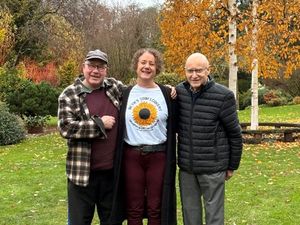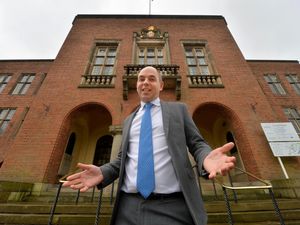You don't need a degree to be successful
Despite a year of record breaking A-Level results and hordes of smiling faces, not everybody will have received the news that they were hoping for.
Despite a year of record breaking A-Level results and hordes of smiling faces, not everybody will have received the news that they were hoping for.
With the demand for university places outstripping the supply, it has been reported this year that even straight A students may miss out.
But university isn't the be-all and end-all - many people have been successful without entering higher education.
Sir Alan Sugar left school at 16 and went on to become one of the most powerful businessmen in the country.
Here we tell the success stories of two local people, neither of whom went to university after leaving school.
For some people University is just not an option. This was my predicament. At 17, and half way through my first year of A-levels I simply had to leave home to escape an abusive paternal relationship.
The only way to make it was to work, and work I did.
Restaurants, Pubs, vehicle repair shops, anything to pay the bills. I always wanted to better myself and knew I had the ability (if not the qualifications). And I knew I had to be the best I could in all aspects of what I do. This led to a string of management jobs (low end stuff) in all sorts of areas.
I frequently came across graduates who walked in to jobs that I had taken years to achieve, but what set me apart was a work ethic and experience.
I found at the tender age of 30 that I was really drawn to education and care, and wanted to be an educator.
I started work at the Glasshouse College in Stourbridge and worked my way up from a care worker, to a tutor, Houseparent and eventually after 7 years of trying to be the best at whatever role I took I managed to get my current position of Student Journey Manager.
It's an exciting and vibrant role within an innovative and creative company. My employer, The Ruskin Mill Educational Trust is an organic organisation that promotes the growth of staff and students alike.
I have found my dream job within my dream organisation, but at 37 I see younger people come with degrees that get the same position in a much shorter time scale.
The real test in my eyes is sustainability. I've worked hard and in the process have a good understanding of the organisation. This has made me more appreciative of where I am and what I do.
I have kept going in a difficult time and watched as some very talented and wonderful graduates have started the job and then found the role too challenging.
I believe that having to fight your way up the career path without a degree can be as much of a blessing as anything, especially nowadays when we see post-graduate unemployment levels.
I've worked for 20 years and in that time have a wealth of experience, and developed a work ethic that you can't get in a classroom.
I have had to study evenings and weekends, I've had to personally fund most of my studies and I wouldn't change it one little bit.
What would A-levels and Uni done for me? I often wonder if it would have helped.
I certainly wouldn't have met my wife and had my four beautiful children.
Perhaps it might have been a benefit if they had discovered my Dyslexia rather than waiting until 37 to get help on that one, but other than that I can honestly say I feel that working your way up, and earning respect in the process is a very valuable process, academically, from an employment (and employability) aspect and in personal growth.
It's this work ethic that has helped me start my own photography business which is young, and part time, but it is a way of developing my creative side whilst making a small income. I hope to expand on this in future years, but not at the cost of my main job.
I left school in 1981 at the time of a big recession with 3.5 million people unemployed.
I wanted to work for a year so I deferred my university place to do a degree in economics.
I got into the Civil Service as a direct entrant and taken into a junior management role because of my A level qualifications.
I worked for the Department of Social Security in Handsworth Birmingham and six other direct entrants started with me, four of which were straight out of university.
Due to the recession this was the only job that they could get and so I thought, what's the point in going to university?
I didn't take up the place. It was a decision that I would later regret as, even with the tuition fees, I still think that a university education is so much more than the academic qualification and the learning opportunity.
It wasnt until I was in my early 30s when I really found my vocation – working with people with learning disabilities.
I always had an ambition to be a novelist but a book wouldnt come out!
I became interested in the 19th century Austrian philosopher Rudolph Steiner. I found his views about human evolution, death, reincarnation and spiritual development fascinating, but too complex to understand.
I thought his beliefs would make a fascinating framework for a novel about a karmic relationship – i.e. what happens to the characters is affected by their former relationship with one another when they met in a past life.
I started to write Crossing The Silver Bridge over a 12 month period and completed it in late August 2009. By the Autumn to my surprise and delight I had a publisher.
It is due to be published next month. Part of the novel is set around the glassmaking industry in Stourbridge.
I don't think that I have been held back by not going to university, but I think today more employers look for a degree qualification as a minimum entry requirement than they did when I was starting out.







